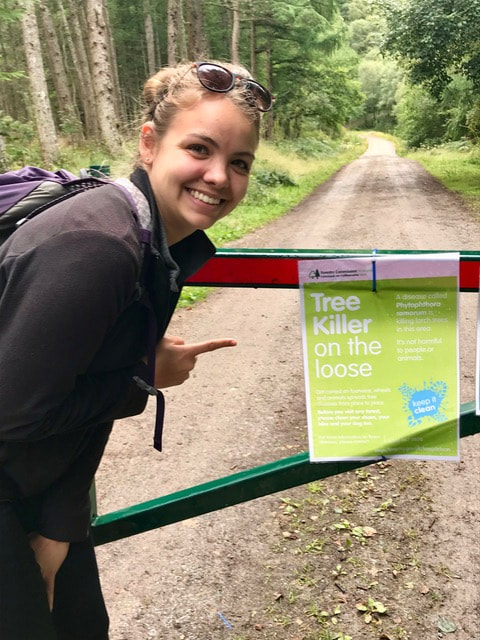I see ecohydrology as the intersection of water and life, whether that interaction is taking place at the scale of a single plant, a catchment, or the entire globe. The feedbacks at this interface create dynamic systems that not only makes ecohydrology a really fun area of science to be working in, but also means we are looking at a lot of important questions to help understand how the environment is functioning now, how that might change in the future, and how we might best manage our environment for a more sustainable future.
What are your undergraduate and graduate degrees in?
I have an undergraduate degree in Chemical Engineering from University of Arizona, an MPhil in Earth Sciences from University of Cambridge, an MS in Environmental Engineering from UC Berkeley, and am currently a working on my PhD in Environmental Engineering at UC Berkeley.
How did you arrive at working in/thinking about ecohydrology?
My undergraduate degree was in chemical engineering, but during my undergrad I spent a summer doing research on photosynthetic traits at the University of Michigan Biological Station. Over the course of doing field research that summer, I came to realize that actual plants were a lot more interesting than chemical plants. After a brief stint in biogeochemistry during my masters, I was drawn to ecohydrology when I found Sally Thompson’s group at UC Berkeley, largely because I just thought she was looking at some interesting questions in really fascinating ways. In retrospect, ecohydrology was a perfect area for me to end up since it allows me to take a lot of the fundamentals and problem solving that I liked in chemical engineering and just apply them in a different context. It’s still a matter of using fundamental concepts of physics, chemistry, and biology to understand and predict fluxes and transformations, but just applying them to things like trees instead of distillation columns.
What do you see as an important emerging area of ecohydrology?
This is a particularly tough question coming off a fantastic week at AGU Conference which really highlighted how much great and fascinating work that is being done in all sorts of areas of ecohydrology. Leaning into my engineering bias towards applied problems, I think it’s really interesting to see the ways in which advances in ecohydrology can help to address the very real and growing challenges we are facing as a society ranging from managing increasingly scarce water resources to feeding a growing population to supporting ecosystem function and services under increasing stresses. As many of the issues we face with a changing climate involve that interface between life and water, I think we have a lot of power as ecohydrologists to work towards solutions and help guide action and policy.
Do you have a favorite ecohydrology paper? Describe/explain.
At the moment I would probably have to go with Dawson and Ehleringer (1991) “Streamside trees that do not use stream water” since it is one that has really stuck with me on a few different levels. Methodologically, I think it really shows how valuable of a tool stable isotopes can be in ecohydrology. On a broader ecological level, it really opened up a lot of questions that we are still grappling with today about where plants are getting their water from, including how different strategies may have implications for broader ecological processes, particularly in the face of environmental change. Finally, on a more human level, I think the findings of this study really highlight how much there is still left for us to discover about the world around us. It’s these sorts of surprising findings that really make me excited as a young scientist to keep exploring and asking questions.
What do you do for fun (apart from ecohydrology)?
When I’m not debugging code at my computer or getting covered in dirt at the campus greenhouse, I can usually be found running, cheering on my hometown Arizona Wildcats, baking, or longingly staring at any dog I see in public.

 RSS Feed
RSS Feed